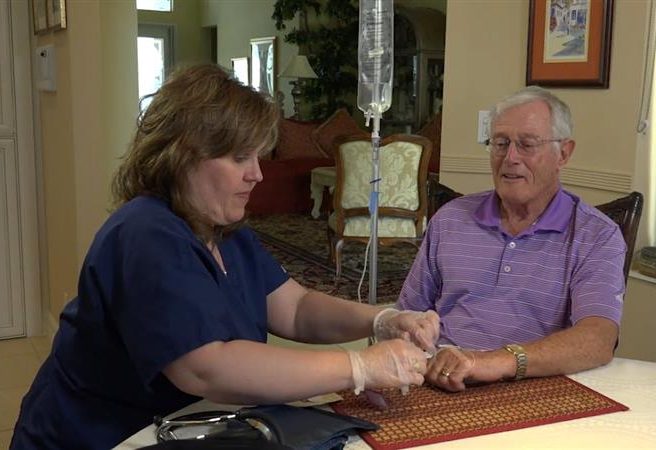Augmentation therapy is an FDA-approved therapy used to treat Alpha-1-related lung disease, specifically emphysema. Alphas on this life-saving therapy get weekly infusions of alpha-1 antitrypsin (AAT). These infusions boost AAT levels in the lungs and bloodstream.
Download What Is Augmentation Therapy as a PDF.
Augmentation therapy is the only specific therapy for Alpha-1 related lung disease. But you’ll use other approaches to treat your lung disease, like:
- Inhaled medicines
- Treating flare-ups with antibiotics and/or oral corticosteroids
- Vaccines for whooping cough, pneumonia, and the flu
- Exercise
- Pulmonary Rehabilitation (“Rehab”)
- Oxygen therapy
- Reducing or removing environmental risk factors at home and work.
What are the goals of augmentation therapy?
Augmentation therapy’s #1 goal is to increase the AAT level in your lungs. AAT also protects your lungs from the damaging effects of neutrophil elastase. Your body’s white blood cells release this enzyme in response to inflammation or infection.
Boosting your AAT levels slows or stops lung damage. It can help prevent flare-ups or make them less severe. It can even treat Alpha-1 related skin disease. But, it doesn’t restore lost lung function and it’s not a cure.
Your options for augmentation therapy
In 1987, the FDA approved Prolastin. Since then, it has approved four other augmentation therapy products in the U.S. All four are safe and effective for boosting AAT levels in the blood and lungs.
- Prolastin®-C Liquid
- Aralast NP®
- Zemaira®
- Glassia®
You may have more options in the future. That’s because researchers are always working on developing new therapies. And, other products are available in other parts of the world.
Understanding infusions
Augmentation therapy infusions require specific preparations. You usually get them in a doctor’s office, an infusion center, or at home. But, some Alphas choose to self-infuse. You can, too, if your health care and health insurance providers allow it. You just need to learn how to do it safely.
Infusions in the home rarely cause severe allergic reactions. However, many home nurses and care providers keep an Epipen around, just in case. Epipens contain epinephrine, strong medicine that stops allergic reactions. You can give yourself a shot while you’re on your way to the emergency room.
In summary, Alphas find that the benefit of slowing emphysema progression outweighs the burden of infusions and side effects.
For more in-depth information on this topic, please visit the Big Fat Reference Guide (BFRG). If you are enrolled in AlphaNet’s Subscriber Portal, you can access the BFRG here.
Download What Is Augmentation Therapy as a PDF.

